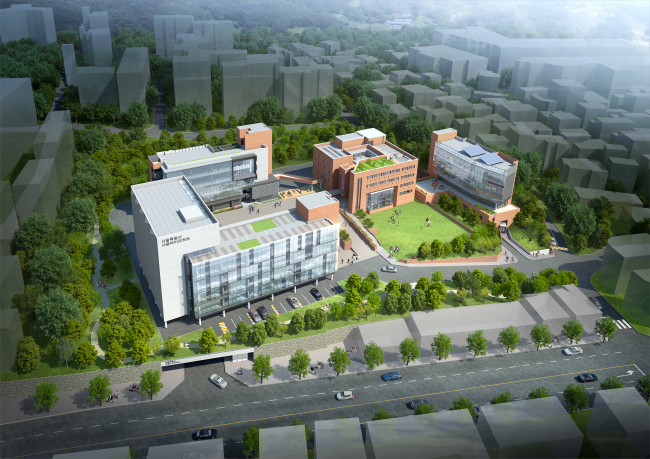The state-run Seoul Bio Hub officially opened in Hongneung, central Seoul, Monday, with the city’s government pledging to lend support to promising local biohealth startups and to forge a biotechnology cluster here.
The Seoul Metropolitan Government held a ceremony celebrating the opening of the first main building in the Seoul Bio Cluster, which houses collaboration offices to connect local biohealth startups with big industry players.
Located in the facility is the Johnson & Johnson Innovation Partnering Office, which began operations Monday. It is operated by the Asia-Pacific branch of J&J Innovation, the strategic venture arm of the US health care giant.
Through its new Seoul base, J&J Innovation said it plans to discover and provide business and research partnership opportunities to South Korean startups specializing in biopharmaceuticals, medical devices and consumer health goods.
 |
Seoul Bio Hub (Seoul Metropolitan Government) |
The new partner office will house 10 startups selected by the city’s program and two winning startups from the “Quick Fire Challenges” competition co-hosted by J&J and the city of Seoul, they said.
Of the 10 selected startups, the top five will receive 150 million won ($133,000) in funding while the remainder will receive three months of business mentorship in areas like patent registrations, technology commercialization and marketing from industry experts.
In addition, Seoul City plans to open a new research and development space and a community center for young entrepreneurs and local citizens by 2018. A global business support center offering access to global startup accelerators and export support is slated for completion by 2023 as well.
The Seoul Bio Hub stands at the center of Korea’s efforts to build up a successful biotech cluster similar to those that are in successful operations in places like Boston, San Diego, London and Singapore.
A biotech cluster refers to a region or city possessing an ecosystem of strong life sciences R&D institutions, venture capital firms, a base of well-trained scientists and a talent pool that can turn good science into new business opportunities.
As part of this push, the city of Seoul plans to provide 500 working spaces for startups by 2023 and invest 15 billion won toward purchasing 99 types of laboratory equipment including microscopes and centrifuges by 2021.
It will also form a 40 billion won fund to help promising biohealth startups in their early stages commercialize their technologies and products and invite more global healthcare startup accelerators to buttress Korea’s biotech innovation.
“The Seoul Bio Hub is a ‘biotech control tower’ that supports everyone from early-stage entrepreneurs to companies preparing to go global. We will work closely with the central government and regional institutions to support the growth of Korea’s biohealth sector,” said Seo Dong-rok, head of the Seoul Metropolitan Government’s economic planning headquarters.
By Sohn Ji-young (
jys@heraldcorp.com)





![[Exclusive] Hyundai Mobis eyes closer ties with BYD](http://res.heraldm.com/phpwas/restmb_idxmake.php?idx=644&simg=/content/image/2024/11/25/20241125050044_0.jpg)
![[Herald Review] 'Gangnam B-Side' combines social realism with masterful suspense, performance](http://res.heraldm.com/phpwas/restmb_idxmake.php?idx=644&simg=/content/image/2024/11/25/20241125050072_0.jpg)

